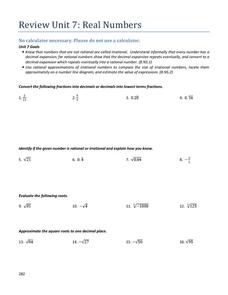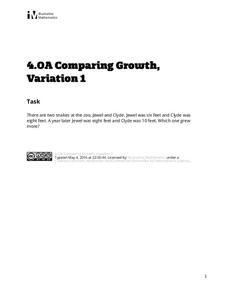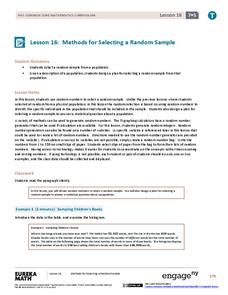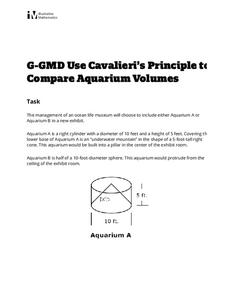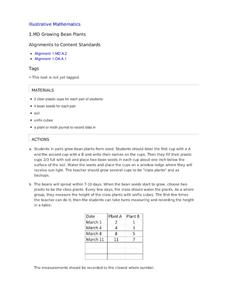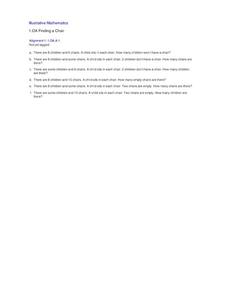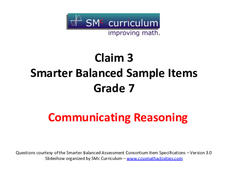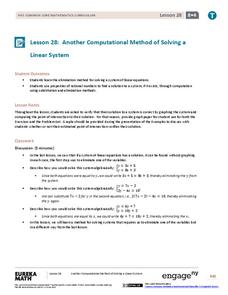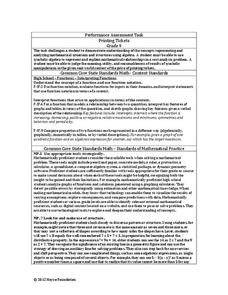Illustrative Mathematics
Comparing Numbers
Young mathematicians spin their way to a deeper number sense with this fun, collaborative activity. Using two spinners, one with the numbers 0-9 and the other with the decades 00-90, pairs of students take turns building and comparing...
Illustrative Mathematics
Ordering Numbers
Deepen the number sense of young mathematicians with this unique ordering exercise. Given a list of the numbers 1, 5, 10, 50, and 100, young learners must determine where the numbers from a second list fit in the sequence. To increase...
Illustrative Mathematics
Converting Decimal Representations of Rational Numbers to Fraction Representations
A rational number is a ratio of two integers. Discuss with your class how to convert the rational numbers of repeating decimals to fractions. A good commentary on letting x equal the repeating decimal and multiplying each side of...
EngageNY
Conducting a Simulation to Estimate the Probability of an Event II
Add some randomization into simulations. The 11th installment in a series of 25 presents two new methods to use in simulations--colored disks, and random numbers. Pupils use random numbers to run simulations where the probabilities make...
Charleston School District
Review Unit 7: Real Numbers
Provide pupils with problems to check their understanding of the concepts within the unit. The seven-part series of lessons covers concepts related to irrational numbers. Learners convert between fractions and decimals, estimate the...
Illustrative Mathematics
Comparing Growth, Variation 1
Young mathematicians compare the growth of two snake lengths in feet over one year in a straightforward word-problem task.
EngageNY
Methods for Selecting a Random Sample
Random sampling is as easy as choosing numbers. Teams use random numbers to create a sample of book lengths from a population of 150 books. The groups continue by developing a technique to create samples to compare from two populations...
Los Angeles County Office of Education
Assessment for the California Mathematics Standards Grade 1
Here is an assessment designed to test mathematicians' knowledge of writing numbers, comparing numbers, skip counting, solving addition and subtraction problems; along with measuring objects, telling time, identifying shapes, reading...
Charleston School District
Pre-Test Unit 7: Real Numbers
Don't be irrational! Use this pre-test to assess your classes' ability to work with all types of real numbers. The lesson asks learners to estimate value, evaluate roots, and order numbers. This begins a series of lessons on the real...
EngageNY
Distance and Complex Numbers 2
Classmates apply midpoint concepts by leapfrogging around the complex plane. The 12th lesson in a 32 segment unit, asks pupils to apply distances and midpoints in relationship to two complex numbers. The class develops a formula to find...
Illustrative Mathematics
Sort and Count II
Capture the engagement of young mathematicians with this hands-on sorting activity. Given a bag of objects, students work independently sorting the items based on their physical attributes, counting to determine the size of each group....
Illustrative Mathematics
Use Cavalieri’s Principle to Compare Aquarium Volumes
Learners are designing a stunning new water feature for an aquarium, but they soon discover that more than just a pretty home for their fishy friends is required. From calculating the volume of a composite shape through the...
EngageNY
Writing and Interpreting Inequality Statements Involving Rational Numbers
Statements often have multiple interpretations — but not these inequality statements. Scholars compare rational numbers and write inequality statements symbolically. The lesson includes problems that require comparing three numbers.
CCSS Math Activities
Smarter Balanced Sample Items: 6th Grade Math – Target D
Elevation often confuses people due to a misunderstanding of negative numbers. Scholars practice applied elevation problems in addition to absolute value and coordinate pair questions. Each slide presents one question to help pupils...
Illustrative Mathematics
Growing Bean Plants
Plant growth experiments offer rich, cross-curricular learning opportunities that can really excite and engage young learners. For this series, children work in pairs planting, measuring, and comparing the height of bean plants in order...
Mathematics Assessment Project
Spinner Bingo
Learners are in it to win it for a fun math activity! After comparing Bingo boards to figure out which one is most likely to win, individuals then determine the numbers to choose in order to create a board with the best...
EngageNY
Comparing Ratios Using Ratio Tables
Decide which concentration of mixtures is the strongest. Pupils use tables to compare ratios involved in mixtures. They use two methods to make the comparisons — by finding equivalent values within the tables or by comparing the...
Illustrative Mathematics
Finding a Chair
Here is an activity that incorporates subtraction in word problems. Youngsters are provided with six word problems that essentially deal with the same numbers in each problem, yet use different comparison language. These problems are...
Los Angeles County Office of Education
Assessment For The California Mathematics Standards Grade 4
Have scholars show what they know with a 20-page assessment aligned to the California State Standards. The test covers concepts such as large and whole numbers, all four mathematical operations, fractions, decimals, geometric figures,...
Los Angeles County Office of Education
Assessment For The California Mathematics Standards Grade 6
Test your scholars' knowledge of a multitude of concepts with an assessment aligned to the California math standards. Using the exam, class members show what they know about the four operations, positive and negative numbers, statistics...
Balanced Assessment
Smaller, Larger, In-Between
Build a solid understanding of rational number relationships by asking class members to use various skills to order decimals, fractions, and numeric power expressions. Using the resource, they find that the fractions do not have an...
CCSS Math Activities
Smarter Balanced Sample Items: 7th Grade Math – Claim 3
Does the explanation make sense? Sample items highlight claim three, communicating reason, in the Smarter Balanced assessments. Teachers use the 16 items to help show pupils the importance of communication and reasoning within...
EngageNY
Another Computational Model of Solving a Linear System
The process of elimination really works! Use elimination when substitution isn't doing the job. The 29th segment in a series of 33 introduces the elimination method to solving linear systems. Pupils work several exercises to grasp the...
Inside Mathematics
Printing Tickets
Determine the better deal. Pupils write the equation for the cost of printing tickets from different printers. They compare the costs graphically and algebraicaly to determine which printer has the best deal based upon the quantity of...




